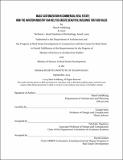Mass-customization in commercial real estate : how the aviation industry can help us create beautiful buildings that add value
Author(s)
Goldklang, Shaul
DownloadFull printable version (19.01Mb)
Alternative title
How the aviation industry can help us create beautiful buildings that add value
Other Contributors
Massachusetts Institute of Technology. Center for Real Estate. Program in Real Estate Development.
Advisor
George Stiny.
Terms of use
Metadata
Show full item recordAbstract
The term "mass-customization" in the Architecture, Engineering and Construction (AEC) industry refers to architectural elements that have similar purpose but are completely different from each other. Architects use mass-customized elements to give diverse design to different parts of a building. Mass-customization derives from three developments in computational technology: Building Information Modeling (BIM), the implications of programing in graphical representation, and the progress of computer-controlled manufacturing machines. However, the promise held by these technologies has not been fulfilled. While mass-customization is implemented in projects with large budgets, they are rarely employed in mainstream real estate. This thesis examines two multi-family projects: The Project on 8 Spruce Street and the Porter House, both located in Manhattan, to outline the challenges of executing commercial real estate projects that employ mass-customized envelope systems and makes suggestions as to how to overcome them. The thesis then examines the aircraft manufacturing industry, which is proficient in the use of Building Information Modeling and has advanced logistical expertise in transporting large-scale elements. The thesis examines its use of design and assembly processes such as Concurrent Engineering and Lean Manufacturing, and suggests that these techniques can be incorporated into the project delivery methods of the AEC industry. The thesis focuses on the production of fuselage and metallic wing skin panels, distinguishing between fabrication technologies that are used for the manufacturing of single-curved and double-curved panels. The thesis proposes ways in which these processes can be adapted to the standards of the Architecture, Engineering and Construction industry, and suggests that such adaptation could reduce fabrication costs. The thesis concludes by outlining the incentives for the aircraft industry to transition part of its operation into the fabrication of mass-customized envelopes for commercial real estate, pointing to the potential markets for such systems in the growing economies of China, Latin America and India. This thesis attempts to demonstrate the potential of utilizing features of the aircraft manufacturing industry so as to improve cooperation between all parties involved in the process of commercial real estate development and to create more beautiful and valuable buildings.
Description
Thesis (S.M. in Architecture Studies)--Massachusetts Institute of Technology, Dept. of Architecture; and, Thesis (S.M. in Real Estate Development)--Massachusetts Institute of Technology, Program in Real Estate Development in Conjunction with the Center for Real Estate, 2013. Cataloged from PDF version of thesis. Includes bibliographical references (pages 140-151).
Date issued
2013Department
Massachusetts Institute of Technology. Center for Real Estate. Program in Real Estate Development.; Massachusetts Institute of Technology. Center for Real Estate; Massachusetts Institute of Technology. Department of ArchitecturePublisher
Massachusetts Institute of Technology
Keywords
Architecture., Center for Real Estate. Program in Real Estate Development.